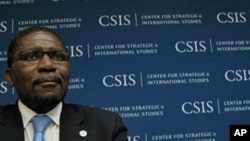After being a U.S.-backed rebellion for decades in Angola, the National Union for the Total Independence of Angola, or UNITA, is now struggling as a political entity. Its leader, Isaias Samakuva, is threatening massive street protests if there are no guarantees for free and fair elections expected later this year. Samakuva spoke at a Washington event on Tuesday.
At the Center for Strategic and International Studies, Samakuva said that protests in recent months in Angola have not included UNITA members or supporters. But he warned that could change soon, if measures are not taken to ensure a credible election.
"We prefer to work for a peaceful change at the elections," said Samukva. "But if we realize that the government is not willing to have a clear and a transparent electoral process, then we will be in the streets. This is a possibility now. We are already mobilizing our people. And in May, if the government does not change the situation, we will be in the streets."
Legislative elections could be held by early September. Following the vote, the leader of the party with the most seats will become president of Angola.
But there are concerns by UNITA and other groups that the chairperson of the national electoral commission is part of the ruling party and a lawyer, rather than a judge as the law stipulates. And voter registration began before new electoral legislation was passed.
In the most recent election, in 2008, the ruling People's Movement for the Liberation of Angola, or MPLA, won more than 80 percent of the vote and 191 of 220 legislative seats. UNITA won only 16 seats.
The head of the MPLA, Angolan President Jose Eduardo dos Santos, has been in office since 1979.
Samakuva alleges voting during the president 's rule has been repeatedly rigged, but that in recent years UNITA has accepted what Samakuva called "electoral fraud" to preserve peace and stability after three decades of civil war.
In a speech earlier this month, President dos Santos celebrated 10 years of peace, while repeatedly denying claims the coming elections were being rigged. He said those who are strong do not need to cheat to win.
In Washington, Samakuva called on foreign election observers to be accepted and to quickly go to Angola to monitor the entire process.
"We feel it gives more credibility to the elections and the presence of observers serves as well as a dissuasion measure for the tendency of rigging the elections," he said.
The UNITA leader said his party's platform will highlight the economic disparities and extreme poverty in Angola, despite the country's production of nearly 2 million barrels of oil per day.
Samakuva dismissed concerns that UNITA had been weakened by the decision of former party officials, led by Abel Chivukuvuku, to create a new organization, the Convergence of Angolan Salvation. Samakuva said UNITA has registered some 250,000 new members in recent months, as it prepares to be more competitive in the elections.
News
Angola's UNITA Party Threatens Protests




